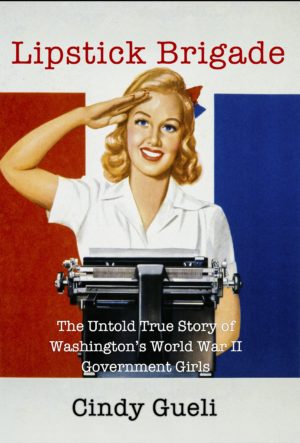In her book “Lipstick Brigade,” Dr. Cindy Gueli brings to light the almost-lost history of World War II’s ‘Government Girls.’
 It’s one thing to document history by encountering it through antiquities, long-lost archives and dead-end trails left for an informed imagination to reconstruct. Then comes the history that remains so real, it lives, breathes and speaks through the women who made it. In those instances, the historian blossoms into a dynamic preservationist: working to record, for all time, remarkable stories and deeds that hide in plain sight. That mission becomes all the more critical when the history-makers in question — women office workers who served our nation’s military during World War II — themselves may be unaware of their critical, collective role.
It’s one thing to document history by encountering it through antiquities, long-lost archives and dead-end trails left for an informed imagination to reconstruct. Then comes the history that remains so real, it lives, breathes and speaks through the women who made it. In those instances, the historian blossoms into a dynamic preservationist: working to record, for all time, remarkable stories and deeds that hide in plain sight. That mission becomes all the more critical when the history-makers in question — women office workers who served our nation’s military during World War II — themselves may be unaware of their critical, collective role.
All this, and more, makes the work of Dr. Cindy Gueli all the more essential. A doctorate holder in history from American University and a skilled media professional, she’s the author of “Lipstick Brigade: The Untold True Story of Washington’s World War II Government Girls.” In it, she retraces and recovers the stories of these “soldiers without guns,” as they were popularly known. The stories are joyful and compelling, and the book sparkles with just the kind of writing that beckons readers to join her in a journey of ’40s-era rediscovery.
“Almost 200,000 women came to Washington to work for the government during World War II,” Gueli writes. “They were young. They were single. Many were shedding the economic restrictions of the Great Depression and the social restrictions of protective families and small-town life. Joining this so-called ‘Lipstick Brigade’ as a civilian or with the military offered women a break with the past and new prospects for the future.”
We spoke with Dr. Gueli about her work on the book, its importance in telling a more complete story of World War II, and how her Italian roots figured into a love of storytelling that defines her to this day.
 Lou&A: Tell us about your Italian roots.
Lou&A: Tell us about your Italian roots.
Dr. Cindy Gueli: My mother’s family generally comes from Vallo della Lucania, Venafro, and Naples in Italy. My father’s family mostly comes Campobello di Licata, Trapani and Palermo in Sicily. We’ve been lucky enough to remain in touch and visit with relatives from both sides. I’m originally from New York and now live in Washington, D.C.
Lou&A: How did growing up in an Italian household influence your career and life path?
Gueli: The stories I heard within my own family clearly showed how essential every Italian immigrant was in building the businesses and institutions — in the case of railroad workers and stonemasons, quite literally — that form the foundation of modern America. Uncovering these connections to the past and their influence on the present for every ethnicity, gender and generation became an underlying goal of my research and teaching.
Lou&A: Tell us briefly about your own path to where you are now and what inspired your love of history, the media and film. When did the proverbial light bulb go on?
Gueli: I didn’t have a single light bulb moment. I had many signposts leading me toward history my entire life. I was fortunate to grow up between New York and Washington, two cities with multi-layered pasts still evident in their urban designs and iconic buildings. Traveling with family to even older and more storied sites in Italy only deepened my visceral connection and curiosity about the material world.
The books, school projects, films, theater and adventures I pursued all revolved around understanding the events and decisions that created our current experience in time. Working in the media has allowed me to capture those experiences in the so-called “first rough draft of history,” and becoming a professional historian gives me the chance to systematically analyze them on a broader scale.
Lou&A: What inspired you in particular to pursue the story of the “Lipstick Brigade”? It sounds as though these women might otherwise have been forgotten to history.
Gueli: I read an anniversary notice for a woman who met her husband while working in World War II Washington. She was one of almost a quarter of a million female office workers who staffed the offices of America’s central command post. I decided to research and interview some of these “Government Girls,” or “the Lipstick Brigade” as the media dubbed them, for a graduate seminar. Speaking with these fantastically vibrant and adventurous women convinced me that their stories needed to be explored and shared.
Lou&A: And their life stories figured into your own.
Gueli: Civilians and servicewomen served in jobs such as clerks, stenographers, code breakers and spies. The popular nicknames were cutesy, but their work was essential. And their experiences were transformational to both them and to the city. The seminar topic evolved into my doctoral dissertation, and that expanded into the final book.
Lou&A: When you look at the road you’ve traveled — both personally and in your successful career — what have been some highlights? What are some things you’d love to accomplish?
Gueli: “Lipstick Brigade” has been optioned for a film…
Lou&A: Wow!
Gueli: … and I’m excited to consult with the producers on bringing these women’s stories to an even wider audience. My current writing project is a history of sex in our nation’s capital that covers topics ranging from prostitution to the Lavender Scare to presidential “sexcapades.” And “Scandalous Washington,” a video and audio podcast covering similar themes to a college course I created, is in the works.
Lou&A: What do you hope readers take away from “Lipstick Brigade”? What did you take away from writing it?
Gueli: I hope readers vicariously experience World War II Washington through the lens of these women’s lives. Government Girls were legends in their own time but are largely forgotten in ours. We could not have won the war without them. Washington, D.C., would never be the same. These women’s contributions to World War II need to be more widely known.
For me in terms of writing this book, I have had the great fortune of taking away treasured new friendships with inspiring women I interviewed — and Government Girls’ relatives who warmly invited me into their homes and family histories.
Lou&A: At the end of the day, what have been the most rewarding aspects of your work, and how do you connect this back to your heritage and upbringing?
Gueli: I get to follow where my peripatetic curiosity leads, and I inevitably meet intriguing people along the journey. I’m incredibly lucky to pursue my own research, writing and media interests as a career. By necessity of being immigrants in an environment that was often hostile to their recent arrival and Italian background, many of my relatives started their own businesses.
This entrepreneurial spirit remains a family trait. My parents encouraged both a passion for learning and taking risks to pursue opportunities, even if they are outside of my comfort zone. Ultimately for me, being Italian American has meant sharing a legacy of courage to realize our boldest dreams.
For more information on Dr. Cindy Gueli and her book “Lipstick Brigade,” visit cindygueli.com.
The above appears in the September 2019 issue of the print version of Fra Noi. Our gorgeous, monthly magazine contains a veritable feast of news and views, profiles and features, entertainment and culture. To subscribe, click here.
 Fra Noi Embrace Your Inner Italian
Fra Noi Embrace Your Inner Italian






